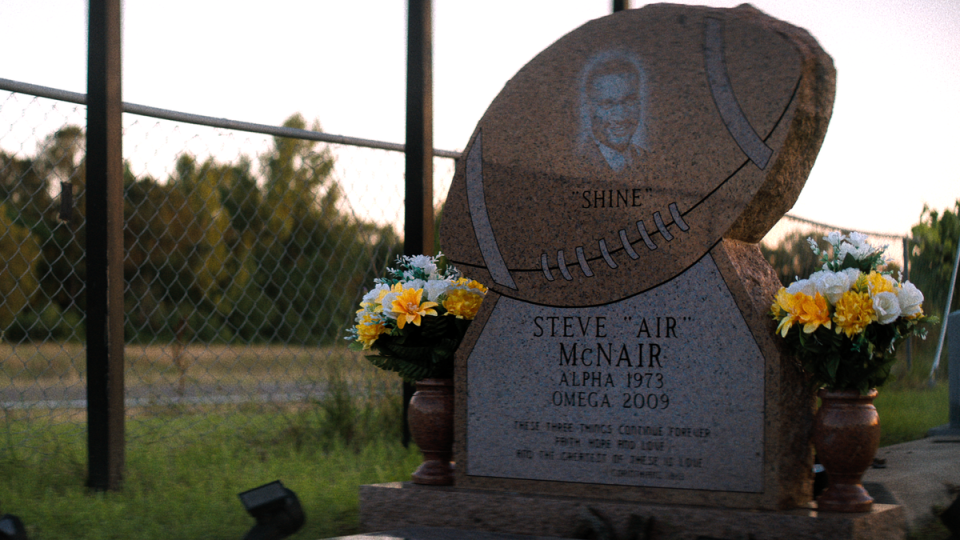Steve McNair was living the American dream.
From a small town in Mississippi, McNair rose to the top of the football ranks at Alcorn State University, where he broke national records in passing and offensive yards and was named an All-American.
Then it was off to the NFL, where he played for the Houston Oilers and racked up consecutive wins with the Tennessee Titans. The quarterback made it to the Superbowl in 1999, nearly grazing victory against the Buffalo Bills.
By the time he retired in 2007, he’d been named the NFL MVP and a three-time Pro Bowler.
But things turned a nightmare on the evening of July 4, 2009, when a friend of McNair’s made a panicked phone call to police: two bodies had been found dead in a condominium in Nashville. One of them was McNair, lying facedown on a bloodied couch. And the other was a mysterious woman — who would later be identified as McNair’s girlfriend — with gunpowder on her hands.
The dramatic case is revisited in Untold, a new Netflix sports documentary series that spoke to investigators and friends of the fallen quarterback to uncover what really happened.
Police would eventually conclude that 20-year-old Sahel “Jenni” Kazemi was responsible for both deaths in a murder-suicide case. But a private investigator criticized the Nashville Police Department’s investigation and believes the case isn’t so open and shut.

A fateful July 4th evening
Nashville was enjoying a festive Independence Day when police received that 2009 call from Robert Gaddy, a close friend and business partner of McNair.
Gaddy told police he saw a man with his head cocked down and blood stains on his Air Force sneakers. He had been shot in the head, and next to him was Kazemi, with a gun underneath her hand. Gunshots dotted the walls.
A frenzy quickly formed around the murder scene as police and fans received notice that one of the dead bodies was Steve McNair, the football star who had just retired two years earlier after a 13-year career.
“People liked him. He smiled, he was quiet,” said Jeff Fisher, McNair’s former NFL coach who shepherded him and his teammates to stardom. “He didn’t really like the cameras and interviews, but there was no question he had the capability to excel at this level.”
But it was Wayne Neely, another friend of McNair, who had first seen the dead bodies. Neely reportedly walked into the apartment, which he had co-leased with McNair, and did not realize the body on the couch was his friend. After seeing the gun shell casing on the floor, he rang Gaddy.
Gaddy had played football with McNair at Alcorn State and was his business partner.
But the two had had a falling out after they got into a dispute over a $13,000 check.
Gaddy quickly came over after Neely reached out and was the one to call police but he had left by the time the officers arrived.
Forty–four minutes had elapsed between the discovery of McNair’s body and the first 911 call.
Identifying a motive for either suspect would prove difficult. That’s when Charles Robinson, a detective at the Nashville Police Department, set his sights on McNair’s ex-girlfriend.


A troubled relationship: deceit, betrayal, and tragedy
Kazemi, who was originally from Iran, worked as a waitress at a local Dave & Buster’s, where football teams often frequented and where McNair would meet the 20-year-old. Despite McNair’s marriage, the two would embark on romantic getaways for the six months they were together.
“They started to really fall for each other, and it was genuine,” said Emily Andrews, a friend of Kazemi. “They had conversations about adopting kids one day together and really building a life together.” They had allegedly been looking at houses.
A relative of Kazemi reinforced that image: “She was happy with him. She said that he was getting divorced very soon, in about two weeks.”
So investigators began looking into her ex-boyfriend Keith Norfleet, an admirer of McNair who felt betrayed after Kazemi began dating the former MVP.
Police interrogated Norfleet after he posted on his MySpace profile: “never let anything or anyone come in between you and the one you love because when you do you lose everything.”
It was true: “My ex-girlfriend, who I’m still in love with, was now gonna be with my favorite player of all time,” Norfleet said in Untold. The two had separated but were still living together as their lease hadn’t ended.
But Norfleet had posted the quote months before their deaths, and long before she had moved out; he told police he had no knowledge of the apartment where McNair and Kazemi were found dead.
Investigators then uncovered text messages between Kazemi and McNair, painting a woman in duress. “baby I might have a breakdown Im so stressed,” one text read.
Kazemi had been asking McNair for financial help: she held debt from a previous rent arrangement and car payments on a 2007 Cadillac Escalade she and McNair co-signed.
Their relationship was under strain: Kazemi realized she wasn’t the only woman in McNair’s life after she found condoms in the downtown condominium they co-owned. “I think he really broke her heart,” Andrews said.
“I think everything went downhill after Jenni started realizing there was other women that Steve was also seeing,” Robinson said.
Two days before their death, on July 2, Kazemi was arrested on DUI charges while driving McNair and another friend. Several people told investigators Kazemi had expressed anger about Steve not being monogamous.
And just hours after her arrest that night, Kazemi bought a handgun, which would later appear at the condominium where the bodies were discovered.
A Dave & Buster’s employee who spoke to Kazemi the day before her death said she seemed “down.” Kazemi was allegedly overheard saying: “my life has just turned to shit … should just end it.”
For the Nashville Police Department, the sporadic events painted a logical picture: a distressed Kazemi shot McNair and then took herself out with a gunshot to her head. So the deaths were ruled a murder-suicide case, leaving a sordid tale of betrayal, tragedy, and faded glory.
Doubts in the murder-suicide case
While the official narrative ascribed the couple’s deaths to Kazemi, Vincent Hill, a private investigator, saw holes in the investigation.
“Police made a lot of mistakes,” Hill said in Untold.


They believe the man who sold Kazemi the handgun was Adrian Gilliam, who had been previously convicted of murder and armed robbery. Police interrogated Gilliam for seven minutes, who said he did not know Kazemi’s name.
But cell phone records revealed Kazemi and Gilliam had exchanged 203 phone calls and text messages in the three weeks leading up to the deaths.
Gilliam was also one of the last people to speak to Kazemi at 12:02 am on July 4. He said he was headed to a friend’s house during the time of the murders, but that friend contradicted his account. In 2009, Adrian Gilliam was sentenced to two and a half years in federal prison for being a felon in possession of a firearm, though not in connection to McNair or Kazemi’s deaths.
Hill, whose self-published book Playbook to a Murder outlines theories to explain McNair’s death, requested to have the case reopened in 2010, but was dismissed by a grand jury due to a lack of evidence.
Whatever happened that July evening may still not be entirely known, but the legacy of the Tennessee Titan continues to reverberate. In 2012, McNair was named the 35th greatest quarterback of the NFL’s post-merger era and in 2020 was inducted into the College Football Hall of Fame.
“The sun was out. There was not a cloud in the sky,” a former Titans player recalled the day McNair died. “Then all of a sudden when the word spread of Steve’s passing, it became really somber and it started raining. It was this dark cloud just hanging over the city that whole weekend.”
Source Agencies


